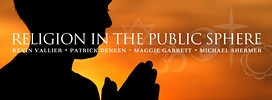I’m grateful that Michael Shermer joined the discussion and that he’s outlined his own approach. The main aim of Shermer’s piece is to agree with my conclusion that a great deal of religious liberty in the public sphere is fine, but not for the reasons I cite. The ultimate basis of political order, for Shermer, is the prospect of embodying Enlightenment principles of reason and experiment in politics:
Assertions of religion in the political sphere are becoming as obsolete as those in the scientific realm, and often just as wrong when they collide with reality. Still, just as in science, people must be free to be wrong, for how else will we come to understand what is right? The private religious beliefs of individuals may be asserted and tested in the public sphere—by which I mean the public marketplace of ideas—but never squelched or forced upon anyone through the law.
Religious political claims have been socially tested and refuted, but they’re useful to have around to remind us of failed past experiments in the realm of moral ideas. An appropriately experimental democracy shouldn’t be threatened by religion in politics.
In my response, I’d like to focus on Shermer’s positive proposal for a scientific basis for politics. I begin with an admission that Shermer’s approach sounds less like an Enlightenment view and more like contemporary pragmatist approaches to democracy. On the latter view, government is an extension of our ordinary practices of inquiry, and science provides the ideal model of inquiry.
Of course, Shermer doesn’t defend pragmatist theses about moral truth (where moral truth is constructed in the experimental process), but he also doesn’t defend the Enlightenment appeal to objective morality as deducible from incontestable axioms or the consistency of overwhelming observational confirmation. But it is nonetheless a position I respect.
My main concern about Shermer’s view is that it suggests that social epistemic processes will gradually converge on secular, scientific foundations for morality that will prove more effective in grounding political institutions. I am much less confident in the ability of the use of moral reasoning to generate agreement. Following Rawls, I think free exercises of practical reasoning tend to lead to disagreement rather than agreement about fundamental matters. That is why, contra Shermer’s claim, religious reasoning is not obsolete when it comes to justifying laws and policies. Many continue to believe that religions can serve as explanations of moral truth. This is even true among moral philosophers, an increasing minority of whom are theists.
My Rawlsian intuition is that any successful social order is going to develop many contradictory paths to moral consensus that will never be resolved in favor of one option or another. At least for the foreseeable future, Shermer’s scientistic approach to political order will remain as sectarian and philosophically dubious to many citizens as religious views. What we need instead is an overlapping consensus of approaches, of which Shermer’s view could form an important part.

